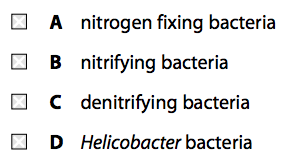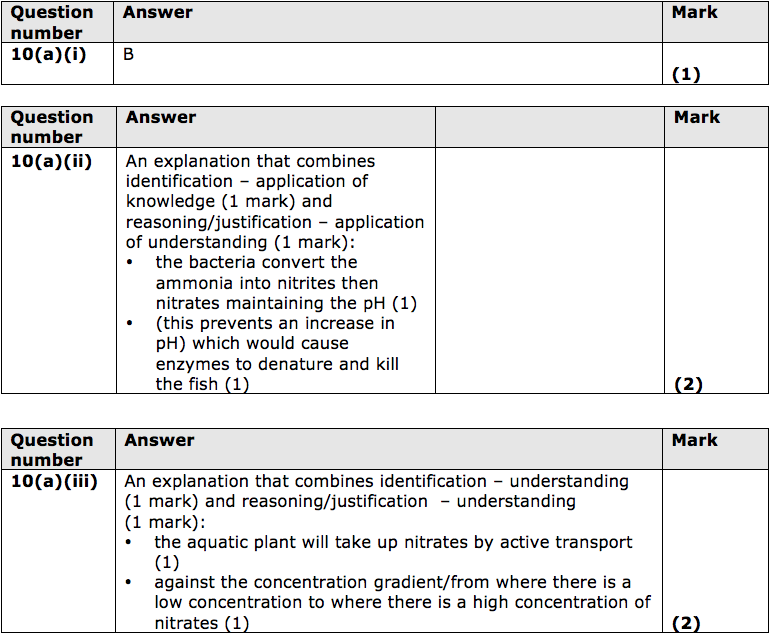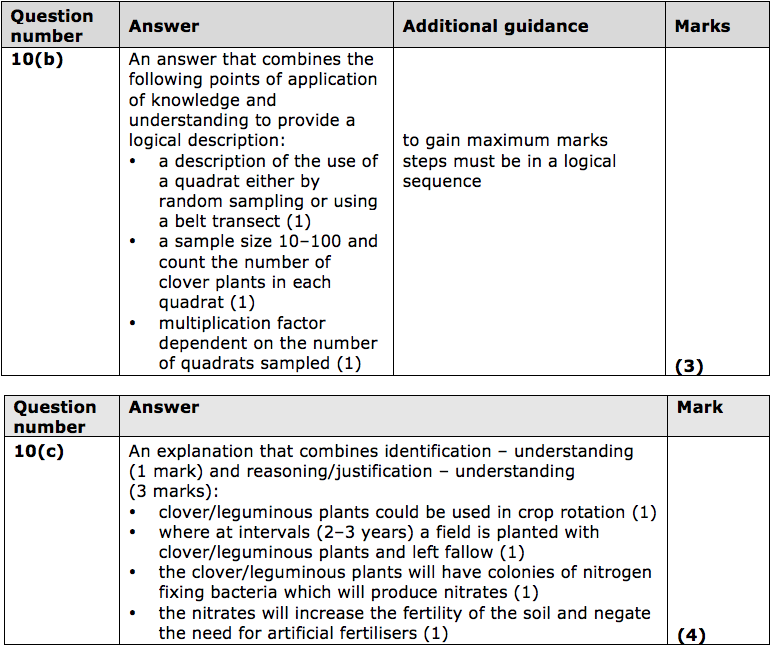B2 H - Sample set 1 Q10 Answers
10) Tropical fish excrete ammonia, which is an alkali.
The pH level of water in a tropical fish tank needs to be maintained between 6.6 and 7.4 for the fish to survive.
This is the optimum pH range for the bacteria that are responsible for the conversion of ammonia into nitrites and then nitrates.
Nitrosomonas bacteria convert ammonia into nitrites.
Nitrobacter bacteria convert nitrites into nitrates.
(a) (i) Nitrosomonas bacteria are an example of (1)
The pH level of water in a tropical fish tank needs to be maintained between 6.6 and 7.4 for the fish to survive.
This is the optimum pH range for the bacteria that are responsible for the conversion of ammonia into nitrites and then nitrates.
Nitrosomonas bacteria convert ammonia into nitrites.
Nitrobacter bacteria convert nitrites into nitrates.
(a) (i) Nitrosomonas bacteria are an example of (1)
(ii) Explain why Nitrosomonas and Nitrobacter bacteria are needed in tropical fish tanks. (2)
An aquatic plant in the fish tank had a concentration of nitrates higher than the water in the fish tank. (iii) Explain how this aquatic plant can uptake nitrates from the water in the fish tank. (2)
An aquatic plant in the fish tank had a concentration of nitrates higher than the water in the fish tank.
(iii) Explain how this aquatic plant can uptake nitrates from the water in the fish tank. (2)
Leguminous plants have nodules on their roots that have colonies of nitrogen-fixing bacteria.
Clover is a leguminous plant.
(b) Describe how a quadrat could be used to sample the population of clover in a 500m2 field. (3)
The nitrogen-fixing bacteria provide nitrates for the plants and release any excess into the soil.
(c) Explain how leguminous plants such as clover could be used to reduce the amount of artificial fertilisers. (4)
(Total for Question 10 = 12 marks)
An aquatic plant in the fish tank had a concentration of nitrates higher than the water in the fish tank. (iii) Explain how this aquatic plant can uptake nitrates from the water in the fish tank. (2)
An aquatic plant in the fish tank had a concentration of nitrates higher than the water in the fish tank.
(iii) Explain how this aquatic plant can uptake nitrates from the water in the fish tank. (2)
Leguminous plants have nodules on their roots that have colonies of nitrogen-fixing bacteria.
Clover is a leguminous plant.
(b) Describe how a quadrat could be used to sample the population of clover in a 500m2 field. (3)
The nitrogen-fixing bacteria provide nitrates for the plants and release any excess into the soil.
(c) Explain how leguminous plants such as clover could be used to reduce the amount of artificial fertilisers. (4)
(Total for Question 10 = 12 marks)



